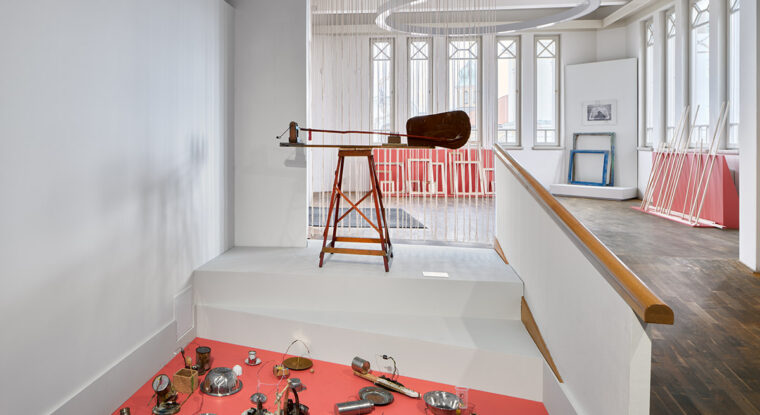
The Art of Interaction seeks to redefine the concept of interaction in art, to transcend our usual understanding of this term in relation to new media and digital art, and to focus on other possibilities for actively involving the viewer into the process of perceiving and creating works of art. The exhibition takes an innovative look at participatory art and the art of collaboration, all of which we include under the art of interaction.
DetailLucie Rosenfeldová’s On The Management of Doubt (2014, part of the GMU collection of Moving Images) – the first of two videos in this exhibition – reflects a time when technology was seen as a model for self-management and self-improvement. Computers were predictable, and so could lay a stable grid over an increasingly unpredictable world. Coaching and therapy offered a rational, mechanistic approach to our personal and professional relationships and asked us to take responsibility for the things we put into the world and the results that came out. Ten years later the second video – a new collaboration between Lucie Rosenfeldová and Matěj Pavlík – tries to establish what has changed about the relationship between ourselves and the world we construct through technology. Our lives have become less predictable, while the systems we have for managing uncertainty – climate models, career plans or economic projections – are less effective. Chaos Therapy suggests that the management of doubt today no longer aims to eliminate uncertainty but instead, like the automatic drawings referenced in Pavlík’s new photographic prints, embraces the irrationality that was always part of culture and technology, overflowing the grid of predictability and embracing the things we can’t control.
DetailSilence Falls presents a new series of paintings by Nikola Kopp Lourková in which silence becomes a place for concentration and gentle observation. The artist lets ordinary objects – chairs, apples, dishes, pins or parts of the body – emerge from soft, layered colours like memories rooted in personal experience. The motifs are more hinted at than depicted literally, as if slowly emerging from a hazy background. Kopp Lourková works with a delicate palette of pink, ochre and flesh tones, complemented by the use of more distinctive colour accents and subtly interrupted lines. In these paintings, silence is not emptiness but attention – a moment when the world shows itself in details that otherwise elude us.
Detail
Presented in the form of an open depository, the exhibition Vladimír Preclík’s Gift to the Hradec Králové Region includes all the works from a collection donated by the sculptor Vladimír Preclík (fifty-four works in total), supplemented by other works from the collection of the Gallery of Modern Art in Hradec Králové.
Detail
Hradec Králové’s Velké náměstí (Great Square) is currently dominated by cars. This large parking area in the historic city centre has been the scene of clashing opinions regarding the square’s current and future use. On the one hand are voices in favour of preserving parking and in support of car traffic, while on the other hand there is an interest in designing public space for people and their daily activities. Czech society has generally cherished its cars and placed them on an untouchable pedestal, but there is currently debate throughout the country as to whether public space should be more accommodating to people or to cars.
Detail